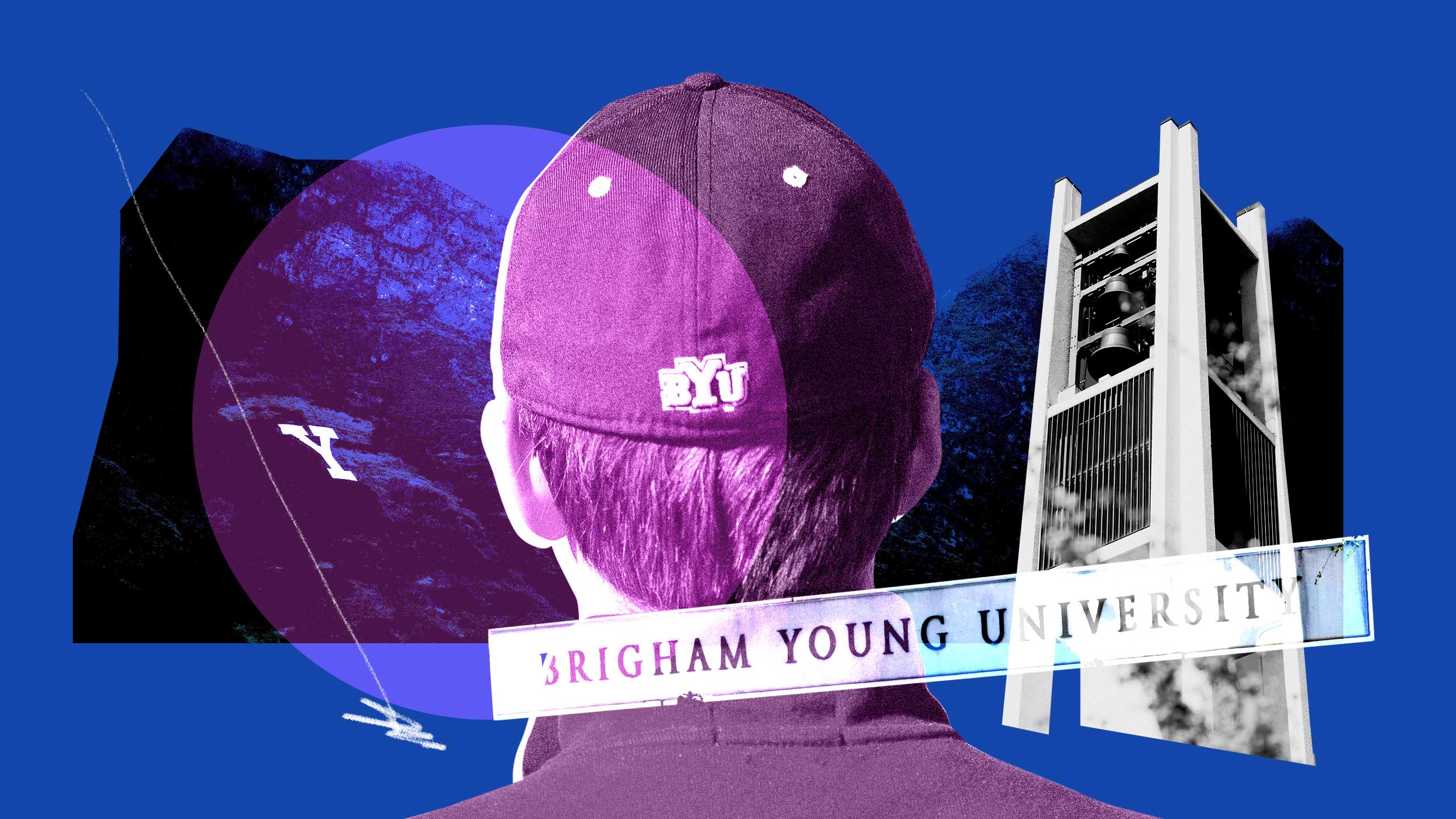The U.S. Department of Education (DOE) is investigating Brigham Young University (BYU), the nation’s largest Mormon college, to determine if the way the school disciplines LGBTQ2S+ students violates their civil rights. Queer students think it does.
“The Honor Code Office is the perennial threat that hangs over every queer student on campus,” former BYU student Calvin Burke tells Xtra. BYU’s Honor Code requires all students to live the principles of the Church of Jesus Christ of Latter-day Saints, since BYU is a religiously affiliated private university. This includes no sexual relations outside of marriage between people of any gender and no “same-sex romantic behavior.”
“You never know how or what BYU will punish you for or what they will react negatively toward,” Burke says. “The enforcement mechanisms are so arbitrary. There are stories of kids getting punished for watching RuPaul’s Drag Race.”
Multiple private complaints over the way BYU treats its LGBTQ2S+ students led the DOE’s Office of Civil Rights to open an investigation on Oct. 21. Allegations against the school claim it violated Title IX, a federal law prohibiting sex-based discrimination in education. In June 2021, the DOE confirmed that Title IX includes discrimination on sexual orientation and gender identity.
BYU stands to lose hundreds of millions of dollars in federal funding if the investigation finds the claims to be founded.
For gay students like Burke, attending BYU meant making sacrifices: he chose not to date while attending the school. During his three and a half years at BYU, Burke was never disciplined for any violation. Still, as an out student, he says the “harassment was relentless.” At one point, Burke says a leader of a homophobic alt-right Mormon movement called DezNat called for a $1,000 bounty for proof of an Honor Code violation that would lead to Burke’s expulsion from BYU.
Burke told multiple BYU administrators that he felt unsafe on campus, to the point that he was afraid he would be killed, and says he was given no assistance. He is now transferring out of BYU part way through his senior year out of fear for his own safety.
“Burke told multiple BYU administrators that he felt unsafe on campus, to the point that he was afraid he would be killed.”
According to sources who spoke with Xtra, members of the DezNat movement seek out queer BYU students to report to the Honor Code Office, which reviews claims of student violations. The Honor Code Office proceeds with disciplining queer students without disciplining DezNat members or offering protection toward the students being harassed. BYU, which did not respond to a request for comment on this story, has never publicly acknowledged or disavowed the DezNat presence.
Former BYU student Kevin Beijerling says that about 50 people affiliated with DezNat took part in a “witch hunt” to track his whereabouts during his sophomore year. After they found intimate images of him online last spring, they discovered his name and location and proceeded to harass and threaten him.
“I couldn’t leave my apartment for several days,” Beijerling tells Xtra. He says he thought the worst: “‘I’m gonna get killed.’”
The Honor Code Office contacted Beijerling to inform him that someone had filed a report regarding the pictures, saying that if they determined he was guilty of posting the photos, he would be expelled. Since he was an international student from New Zealand and his visa depended on his enrollment, he would also be deported. New Zealand’s strict travel policies during the COVID-19 pandemic, however, would have made it very difficult for Beijerling to re-enter his home country if expelled.
“I was scared that I might end up in a situation stuck between two countries refusing entry to me and end up in a border camp,” he says.
Beijerling chose to leave BYU voluntarily last June to avoid being stranded in limbo. His case is still open, he says, and the last time he heard from the school was six months ago. “I’m trying to move on with my life,” he says. “I’m starting at a new school, but I’m dealing still with a lot of traumatic stress and seeing a therapist to try to work through things. It still has an effect on my life.”
Contributing to queer BYU students’ fear is the increasing rhetoric of violence on campus, which they say has not been adequately addressed by school administrators. When former BYU president and Mormon apostle Jeffrey R. Holland spoke at BYU last August, he called for the use of “musket fire” to deal with the “same-sex challenge” affecting the Church of Jesus Christ of Latter-day Saints. For its part, DezNat believes in “blood atonement”—paying for sins by death.
LGBTQ2S+ students felt a momentary glimmer of hope that things were getting better in February 2020 when it appeared the Honor Code had been updated to allow queer students to date. A month later, the school clarified this was not its intention and affirmed that queer students were still not allowed to express romantic attraction between each other.
“I think BYU believes their right to discriminate is more important than my right to exist.”
“You had that bit of excitement, and then right afterward, it came right back with that horrible feeling of: ‘Oh, I don’t belong here. I’m not really welcome,’” former BYU student Austin Haymore tells Xtra.
Prior to the Honor Code confusion, Haymore met a man who wasn’t a BYU student in 2019. He says that man ended up stalking Haymore for months and reported him to the Honor Code Office multiple times for infractions, such as having a Grindr profile. In the end, a report from his stalker over “violating the law of chastity” three weeks before 2021 graduation was enough for the office to take action.
Hours after his graduation became official, Haymore says the Honor Code Office informed him he had been retroactively expelled. After a hasty appeal, he was able to convert his expulsion to a six-month suspension.
Haymore is now working a low-paying job in a field unrelated to his major because he has not received his degree. In the meantime, he must comply with monthly meetings to ensure he is still living the Honor Code during his suspension, which lasts until February 2022. “I do feel they violated my civil rights,” Haymore says, “but I think BYU believes their right to discriminate is more important than my right to exist.”
While BYU has not responded publicly to complaints regarding its alleged mistreatment of LGBTQ2S+ students, the school believes it has the right not to follow anti-discrimination laws, according to president Kevin Worthen. On Nov. 19, Worthen replied to the DOE’s investigation by writing that BYU is religiously exempt from “any application of Title IX relating to sexual orientation and gender identity that is not consistent with the religious tenets of The Church of Jesus Christ of Latter-day Saints.”
“BYU says students who defy the ban may not only be disciplined by the school but arrested.”
After the investigation was opened, BYU responded by cracking down further on its LGBTQ2S+ student population. The school banned student protests on “Y” mountain, where approximately 40 people lit up the iconic letter in rainbow lights last March to support LGBTQ2S+ students. BYU says students who defy the ban may not only be disciplined by the school but arrested.
Meanwhile, LGBTQ2S+ students say that BYU has continued to turn a blind eye to the harassment they face. When BYU professor Hank Smith called Calvin Burke “Korihor” on Twitter in response to a DezNat leader’s tweet, BYU never suspended him from teaching or offered a statement about the incident. “Korihor” is the name for the anti-Christ in the Book of Mormon, the faith’s holiest scripture, and Burke says the term is “the worst word you could call someone in Mormonism.”
“It hit like a gut punch,” Burke remembers of the May 2021 incident. “Professor Smith at one time had been my professor, and he was actually the first professor I’d had that told me to go to graduate school to study religion.”
While LGBTQ2S+ students say BYU is driving many away from the religion, Burke keeps his belief in God and his relationship with the college separate. In fact, his faith is what leads him to believe that BYU has a greater responsibility to LGBTQ2S+ students. “I don’t believe that someone can forget those who are most suffering and most marginalized in society and claim they are at the same time following God, ” he says. “Those in power have an obligation to those who are vulnerable.”


 Why you can trust Xtra
Why you can trust Xtra


